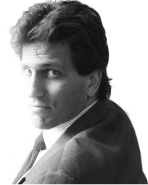(Click here for Russian version of this page)
He was never good at calling it a day. On a warm, summer night last July, it was almost 10 pm when Paul Klebnikov strolled out of his Moscow office – walking briskly, in all likelihood, as was his style. Only on this night, a mysterious dark-windowed automobile was waiting for him. He was shot nine times, but somehow managed to survive until he arrived at the hospital, where his life apparently ended at age 41 inside a stuck elevator. He left behind a large and close-knit family, a noble cause and a plethora of unfinished projects.
With the death of Klebnikov – the only American reporter to be murdered in Russia – the world has surely lost one of its foremost journalistic experts on the vast and murky crossroads of Russian organized crime, politics, law enforcement and big business. The tenacious Klebnikov was a walking database of information on the oligarchs, the Chechen terrorists, the Russian intelligence agencies, and the spread of mafia conglomerates around the globe – data that he could often retrieve from memory, data which he rarely shared with anyone. In investigative journalism circles, the silencing of Klebnikov will be felt even more deeply in the years and financial scandals to come.
Klebnikov had the instincts of a bloodhound, with the mind of a scholar. The American-born son of Russian émigrés graduated from California University, Berkeley and the London School of Economics, completing his doctorate in 1991. He had first traveled to Russia as a tourist in 1984. Five years later he was working as a reporter at Forbes – his primary beat covering Russia’s economic reforms and the rise of the country’s new business leaders. While based in New York, he spent several months each year inside Russia, conducting hundreds, if not thousands, of hard-to-get interviews. He made loyal friends, and ferocious enemies.
Paul interviewed nearly all of Russia’s leading 12 billionaires, having met a number of them at the start of their careers. In 1989, he interviewed Alan Greenspan after the Federal Reserve chairman visited Moscow to advise then-Soviet officials on monetary reform. A year later, Klebnikov was one of two reporters to accompany the U.S. Commerce Secretary and American business leaders on their historic tour of Russia.
He eventually moved to Moscow to become the first editor of Forbes Russia. The magazine’s premier issue, in May 2004, included a list of the 100 richest Russians -- a controversial revelation in a country where too many people on the list earned their money the old-fashioned way – by looting. Even so, Klebnikov was an optimist. He wrote in the magazine that he believed that Russian society had turned the corner and was entering a healthier period.
In addition to his articles, Klebnikov authored two books: “Godfather of the Kremlin: Boris Berezovsky and the Looting of Russia,” and “Conversation with a Barbarian,” a series of his interviews with Chechen rebel leader and onetime Moscow gang boss Khozh-Akhmed Nukhayev, who was recently identified by the Kremlin as the mastermind of the Klebnikov murder. (The announcement, with no evidence to support it, has been met with some skepticism.)
Klebnikov’s work extended beyond Russia. In 2003, he wrote a groundbreaking expose (“Millionaire Mullahs”) that examined corruption among Iran’s theocratic rulers. But it is his work in Russia that led to his greatest successes (including three citations from the Overseas Press Club) -- and his ultimate demise.

